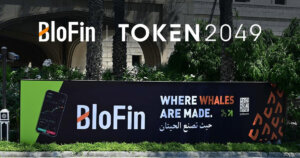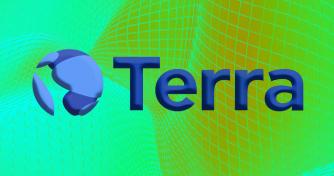 The State of Play: Unpacking crypto policy progress in Washington, D.C.
The State of Play: Unpacking crypto policy progress in Washington, D.C. The State of Play: Unpacking crypto policy progress in Washington, D.C.
Hedera Chief Policy Officer Nilmini Rubin speaks on the state of policy discussions, incentives driving politicians, real world applications, and more in an exclusive interview with CryptoSlate.

New America / CC BY 2.0 DEED / Flickr.com. Remixed by CryptoSlate
2023 saw an unprecedented wave of regulatory actions around cryptocurrencies around the world, but nowhere was the change more noticeable than in the United States. Preceded by an opening salvo in August 2022, when the Treasury Department applied sanctions to the Ethereum coin mixer Tornado Cash, 2023 saw clampdown after clampdown, from multiple SEC suits against central exchanges, criminal charges against developers, and even a guilty plea from the industry’s most prominent public figurehead.
The message is clear: any lingering doubts about the U.S. government’s willingness to intervene in the industry have been put to rest. Now, as we enter the new year with cries for regulatory action growing louder on both sides, 2024 is poised to be a watershed year in crypto policy—for better or for worse.
To further gauge the state of play, CryptoSlate spoke with Nilmini Rubin, the Chief Policy Officer at Hedera, whose current work places her in a unique position to offer insights. With a career that reaches from the halls of Congress to the West Wing itself, Rubin’s extensive experience in policy-making and technology implementation places her at the confluence of blockchain technology, policy, and global market trends.
Conversations
As a party to a variety of conversations on the Hill, Rubin provided some insight into the concerns lawmakers have, which are many and varied. “Some [policymakers] are just interested in learning about the basic technology,” she says. “Others want to dive into the deepest parts of the technology and the policy implications,” she continues, explaining further that concerns range from national security, business opportunities, environmental implications, and more.
The global perspective, Rubin notes, seems different. “They are looking at it from a very different framework. It’s more [about] what are the benefits generally, and how do we mitigate the risks?” This approach, common outside the U.S., reflects a broader, more holistic perspective on blockchain technology. Policymakers in these regions tend to weigh the overall advantages against potential risks, seeking a balanced view that considers both technological innovation and its societal implications.
Contrastingly, Rubin points out that U.S. policymakers often focus on how blockchain fits within current U.S. law and policy. This inward-looking approach is more about integrating new technology into existing frameworks rather than reevaluating or adapting these frameworks to accommodate new possibilities. Rubin further explains that when discussing blockchain policy with counterparts in Asia, for instance, the conversation often involves looking at how different regions like Europe or the UK have tackled similar issues, indicating a more comparative and globally informed approach.
In explaining why U.S. policymakers might not adopt a similar global perspective, Rubin suggests that it’s largely a matter of focus. “They’re really thinking about the United States. They’re thinking about their constituents,” she says. This constituent-focused approach can sometimes limit the scope of their policy considerations to domestic concerns, potentially overlooking broader global perspectives or innovative approaches adopted elsewhere.
Applications
While many think of the crypto space as a world characterized by high risk and hyperbolic expectations, Rubin stresses that Hedera is working from a position of real-world application, with little interest in its token’s secondary market value. It has so far found special uses in agriculture and carbon tracking, both of which have not only huge markets to serve but also stand to benefit from expanded capacities for eco-conscious business practice.
Rubin highlighted Dovu, a marketplace built on Hedera that allows farmers to issue tokenized carbon credits. This innovation offers a dual benefit: it provides farmers with a new revenue stream by monetizing the carbon sequestered in their soil and contributes to environmental sustainability. The process involves farmers planting crops beyond their usual areas and receiving credits for the additional carbon capture. What sets this system apart is its transparency and accountability, as blockchain technology enables precise tracking of where each carbon offset originates, thus avoiding greenwashing.
Rubin emphasized that while the conversation surrounding these technologies often becomes narrowly focused on the fluctuating values of cryptocurrencies as assets, the real value is in what each asset does and what it is for. Regarding the market price of a crypto asset, Rubin says:
“It’s not about that at all. It’s what what the point of this is to enable businesses to thrive. It’s not about the asset. And so we want to show how people are using the technology. The crypto is just a fuel to power the network.”
She explained that, unlike the Web 2.0 model, which relies heavily on advertisement for funding, blockchain technology (or, in Hedera’s case, hashgraph technology) operates on a different paradigm. It utilizes the smaller fees associated with the exchange of information as a funding mechanism. This approach is not only global in its reach but also necessitates rapid processing, for which cryptocurrency becomes a more practical tool than traditional currencies, especially when considering the limitations of standard banking hours and transaction clearances.
2024 and forward
Looking to the future, Rubin expresses a measured optimism about the progress of blockchain regulation in the U.S. She states, “I am hopeful that something will get through that helps advance regulation of blockchain and cryptocurrency in the U.S.” Her optimism is based on the growing awareness among policymakers and an elevated level of discourse around crypto policy in Washington. She acknowledges, however, that things do not happen easily or quickly in Washington, so her optimism is tempered with caution.
Until then, she and others must keep working to advance the conversation where it counts. The intent, as Rubin outlined, is to illuminate the broader utility and richness of blockchain technology for policymakers. The objective is to ensure that any regulations developed to govern this space are crafted in a way that recognizes and harnesses the technology’s potential to benefit consumers and businesses alike.
“We want policymakers to understand like the richness of the technology, so that any rules that they put in place, enable the technology to benefit consumers. If they only think about it from addressing fraud that had been committed by by bad players, they’re going to potentially throw the baby out with the bathwater. We definitely don’t want that to happen.”
There’s a delicate balance to be struck in regulation – to protect against fraud and misuse by bad actors without stifling the innovative and beneficial aspects of the technology. In a year that has seen its headlines dominated by bad actors — and there has been no shortage of them — Nilmini Rubin and her colleagues are reminding U.S. lawmakers daily not to lose sight of the many wonderful applications of the technology when the bad actors are swept away.































































